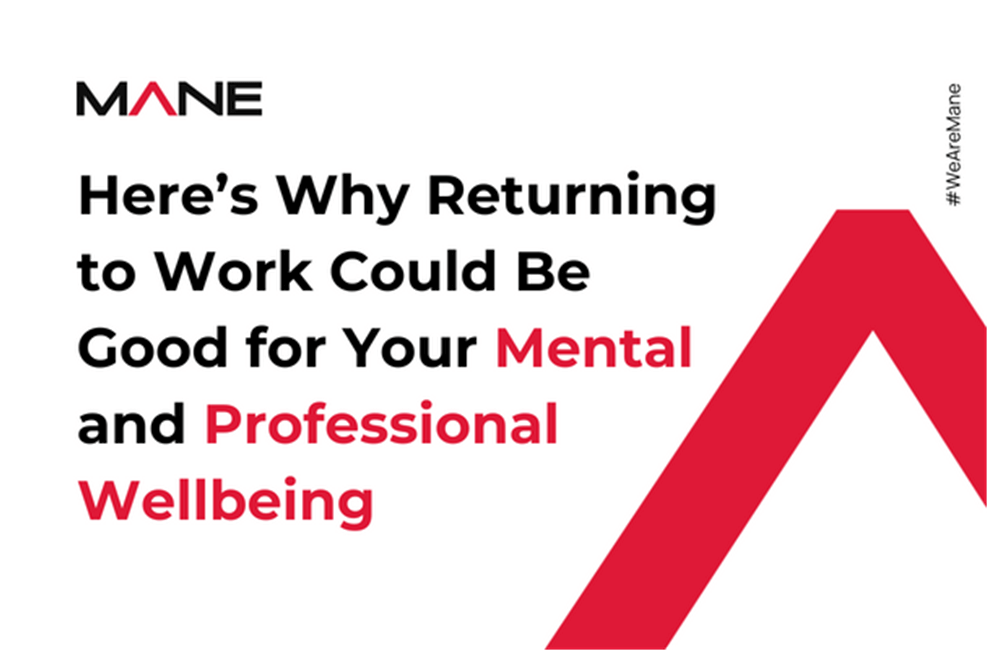Here’s Why Returning to Work Could Be Good for Your Mental and Professional Wellbeing
25 Nov, 202210 minsEmployers all over the country have adapted a new hybrid working model which offers workers ...

Employers all over the country have adapted a new hybrid working model which offers workers more flexibility than ever. During the pandemic, it became apparent that for most employees, their professional roles could be carried out from home.
Such work models allow workers the freedom of choice as to whether they feel more productive and capable of working from home or in the office. However, with more and more people choosing to work from the comfort of their home, psychologists are arguing that it may have an adverse effect on mental health.
Not only this, but working from home can result in a lack of work actually being completed. So, what exactly is the best solution?
Is working from home healthy in the long-term?
According to a well-known psychologist and Director of North Shore Center, Michael Mazius, the answer is no. Though organisations across the globe have made working from home as comfortable as possible with the offering of equipment, he argues it is still not a replica and believes in-office work to be far more beneficial on multiple levels.
Mazius says that social interactions that happen in the workplace play a huge role in our overall wellbeing and happiness levels. Though hybrid and remote working models certainly have some advantages over in-office working, it is still crucial to acknowledge the impact that working from home can have on wellbeing and our mental health state.
For many people, there is a question looming right now and that is one of whether to return to the office or not? Since COVID-19, many people have decided to carry on working from home.
On the other hand, some people such as Joe Flanagan, the Senior Employment Advisor at Velvet.Jobs, who is well-versed in the world of employment as a career matchmaker states that there is no clear decision to be made.
He said: "Certainly we're in a situation where we all still need to be flexible and allow ourselves time to adjust," he says. "But until we're able to replace the depth and impact of in-person conversations, the spontaneity of water cooler talk, and the energy of working in close proximity, engagement will suffer."
Mazius finds, however, that many people he speaks to aren't necessarily eager to ditch the sweats for the office grind. Why? "Human beings are organisms known for habituating," as he puts it. "When we habituate, we grow used to novel changes. I am now seeing what looks like habituation in the form of wanting not only to work from home, but also stay at home."
Are employees really better off WFH?
Mazius has urged employees to really reflect on whether they are in a better position working from home. He said: "Maybe, without even realising it, we're focusing more on what we don't necessarily like about the office and failing to see the good, our brain is a quirky organ system notorious for convincing us that what we want is in our best interest. Without the big picture in mind, we're likely to make bad decisions."
Below, we find more evidence and opinions that going back to work can be highly beneficial for employees, especially on a social level.
How does going to work bring about more empathy and happiness?
"Social interactions are crucial to grow our social brain and social skills," Mazius explains. Without such interactions in the workplace, many people may struggle to foster more empathy, compassion, and relate to others.
An example of this can be attributed to one case where an employee Georganne Hassell who began working for a company remotely October 2021 had only been in the office a handful of times. It took months before she finally met her colleagues in person and with many of them being deaf, video call meetings made interactions far less personal. She said: " working with them over a video conference with American Sign Language interpreters is a great tool, but seeing them in person was energising,".
Work-life balance is becoming more important
For many people, going back to the office provides the opportunity to change up environments, socialise more, and get out of the routine that they’ve slipped into at home. Working from home day in, day out can be very lonely - especially in the long-term.
Flanagan also says, "Many people have been frustrated with the increased responsibility and friction in their homes. For way too long, people have used work as an unhealthy distraction from their lives outside of their job, and maybe now we're more aware of how to balance the two." More and more employers are seeing the importance of providing employees with a good work-life balance. Hence, the introduction of more hybrid working patterns for workers everywhere.
Regain a healthy routine
Psychiatrist Amelia Alvin, who practises at Mango Clinic in Miami says that when you physically choose to go to work, this helps to bring about a healthy routine that you can rely on daily. The act of getting up and getting ready to go into the office then coming home and shutting off for the evening plays a part in a good work-life balance.
Working from home can make it difficult to know when to stop working since the line between home and work are overlapping. This can lead to fatigue, burnout, and feelings of isolation. When you intentionally get up and get ready for work, follow a plan, socialise with other colleagues, and are stimulated in a work environment, this minimises the risk of strain on your mental health. Overall, your mood will be boosted as a result of regaining a healthy routine.
Creativity, confidence, and growth are all possible
Mazius says: "When we're in a social space, we expose ourselves to all kinds of wonderful, important, and interesting possibilities. When we get out there, we take on challenges and thus, grow grit and self confidence,”
Advancement opportunities are clearer
"The office environment can give a new or restructured psychological perception about the life and career of the individual," explains career counsellor Iyejare Olusegun, founder of Self Discovery Blog. He adds: “They can get more assurance of their career advancement and security, then assurance of better lives for themselves and their family, then more feelings of fulfilment through knowledge of active contribution to society; all of which were shaky when away from office work, and major facilitators of anxiety."
Working with coworkers inspires and validates you
Flanagan speaks of the way in which working alongside coworkers can be inspiring and validating, he said: "The identity that we derive from our work is one of the biggest factors that influences our sense of skills, worth, and success, a major part of this identity consists of the co-workers and colleagues, who are not only like-minded individuals on a similar journey as ours, but also the community that sometimes gets more of our time than our families and friends."
He also added that spending time with colleagues and discussing work goals with coworkers, including management boosts confidence levels and makes you feel appreciated more. He added that these interactions "play a big role in reaffirming our sense of value, appreciating our work, and supporting us to grow professionally."


